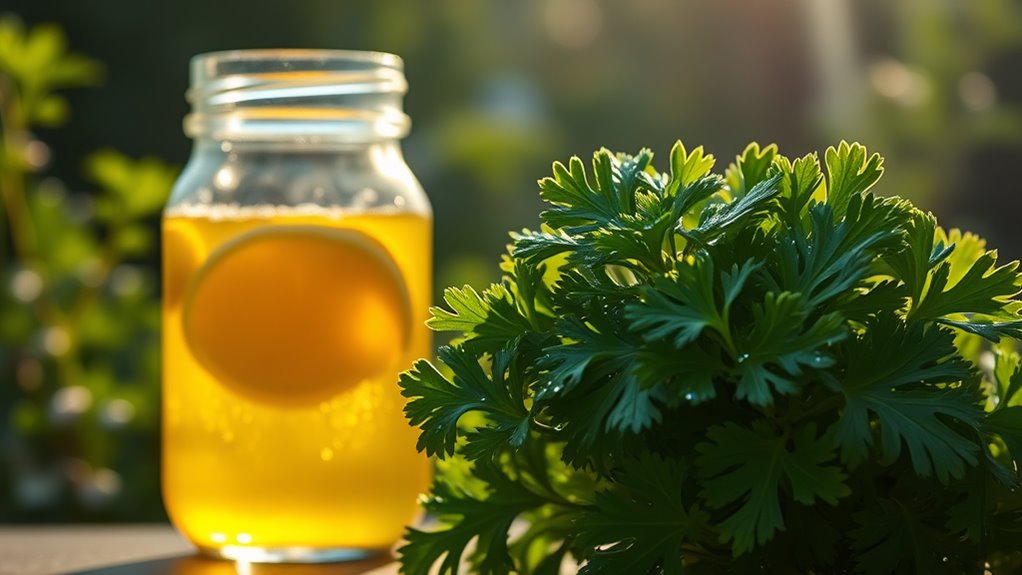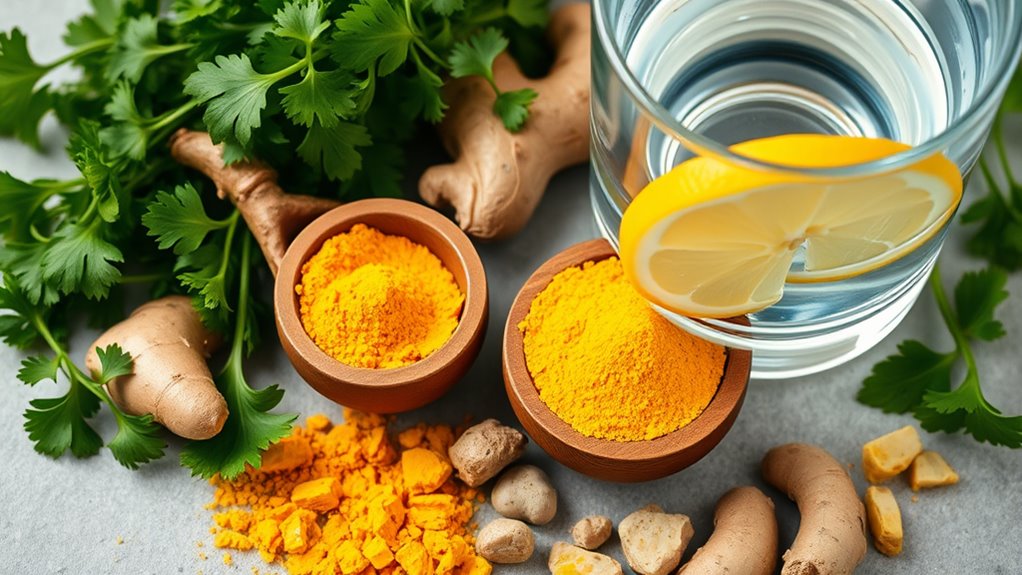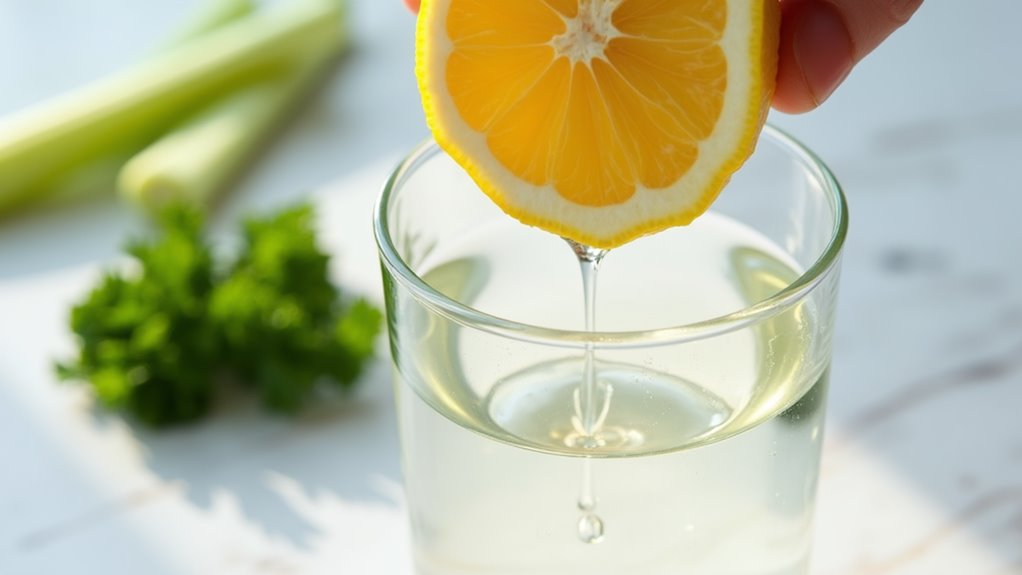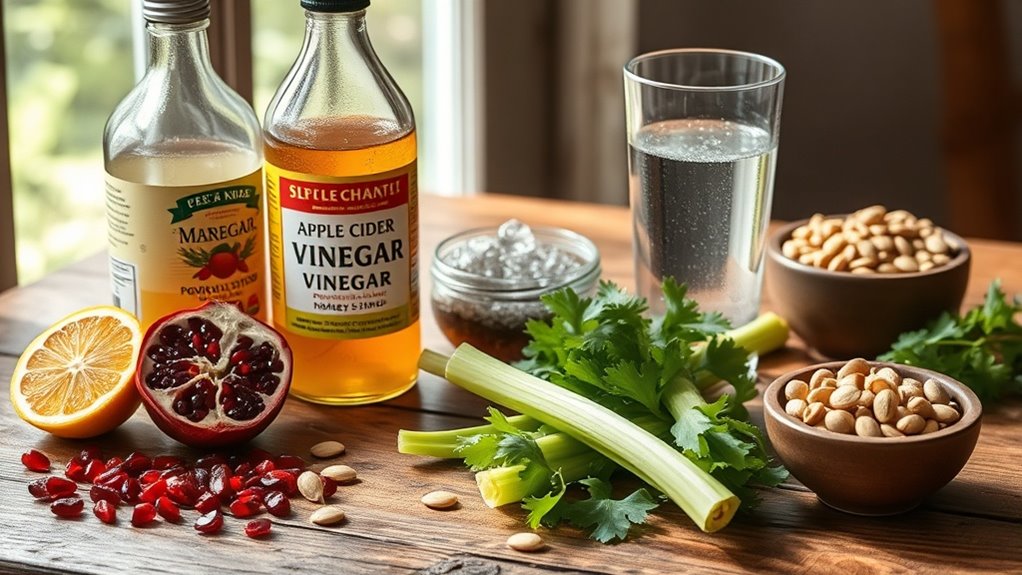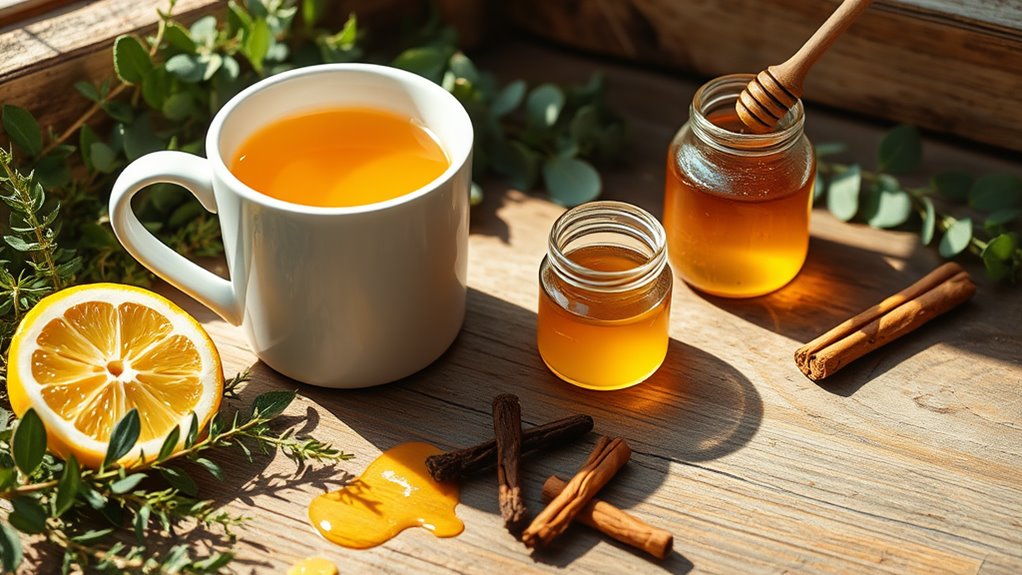Natural Mucus Relief That Actually Works
For effective natural mucus relief, try steam inhalation to hydrate your nasal passages and use herbal teas like peppermint or thyme to loosen mucus. Staying hydrated is key, so drink plenty of water and warm fluids, plus consider home remedies like warm lemon water with honey or ginger tea. Incorporating anti-inflammatory foods like garlic and salmon into your diet can also help. Keep exploring for more tips on enhancing your respiratory health and tackling mucus issues head-on!
Steam Inhalation Techniques
When you’re battling congestion, steam inhalation can be a simple yet effective technique to find relief. This method hydrates your nasal passages and thins mucus, reducing sinus pressure. Humidifiers can help maintain moisture levels in the air, which complements the effects of steam inhalation. Recent studies have shown that natural remedies support the body’s healing processes without just masking symptoms.
Ensure you keep a safe distance of 8–12 inches from hot water to prevent burns. Sessions should last 10–15 minutes, and inhale slowly for optimal results. Enhance this mucus relief remedy by adding eucalyptus or peppermint oils for added benefits. While steam won’t cure infections, it provides temporary comfort, making it an essential part of your mucus relief arsenal. Remember to ventilate after use to prevent mold growth.
Herbal Teas for Mucus Relief
When you’re dealing with mucus, herbal teas can be a soothing and effective remedy. They not only loosen mucus for easier clearance but also provide hydration and support your immune system. For instance, sage tea can soothe sore throats and coughs, making it a beneficial addition to your mucus relief regimen. Additionally, the use of anti-inflammatory foods in your diet can complement the effects of these herbal teas for overall respiratory health. Let’s explore some recommended varieties and tips for preparing these beneficial brews to find relief.
Benefits of Herbal Teas
Herbal teas serve as a comforting remedy for mucus relief, offering both soothing warmth and effective support for respiratory health.
They help clear mucus and ease discomfort while providing additional benefits. Studies show that honey tea is effective in relieving cold symptoms and coughs, making it a valuable addition to your herbal tea repertoire.
Here are some key advantages:
- Warm liquids loosen mucus for easier expulsion.
- Expectorant herbs help relieve symptoms of asthma and COPD.
- Anti-inflammatory properties soothe throat and bronchial irritation.
- Natural ingredients often have fewer side effects than traditional medications.
- They can complement other therapies, promoting quicker recovery.
Incorporating herbal teas into your routine enhances respiratory health while offering a natural, supportive approach to mucus relief.
Recommended Herbal Varieties
Finding effective herbal teas for mucus relief can significantly enhance your respiratory health.
Peppermint tea can help clear mucus while soothing throat pain. Licorice root tea thins mucus, easing expulsion and soothing irritation. Thyme tea, with its antimicrobial and anti-inflammatory properties, helps loosen mucus effectively. Slippery elm tea offers protective qualities, easing upper airway irritation. Finally, elderberry tea may alleviate respiratory symptoms due to its antiviral effects. Additionally, incorporating these teas can act as natural expectorants to help prevent mucus buildup in the respiratory system.
Each tea provides warmth and moisture, promoting better mucus clearance. Embracing these herbal options can be a natural, effective way to support your respiratory well-being and comfort.
Preparation Tips and Techniques
To brew the perfect herbal tea for mucus relief, start by using one key technique: boiling water. This helps extract the active ingredients effectively. Remember to steep for about 10 minutes, allowing full infusion. Afterward, strain the tea to remove any herbs. It’s crucial to let the tea cool down before sipping to prevent burns.
- Add honey for soothing effects
- Incorporate lemon to cut congestion
- Use ginger to thin mucus
- Consider licorice for sore throat relief
- Drinking teas like eucalyptus tea consistently can enhance long-term benefits for mucus relief.
Stay cautious regarding allergies and consult a professional if needed!
Importance of Hydration
Staying hydrated is crucial for maintaining optimal mucus consistency and ensuring your respiratory system functions effectively.
When you drink enough fluids, your mucus remains thin and effective at trapping airborne particles and pathogens.
Conversely, dehydration can thicken mucus, leading to congestion and respiratory issues.
Proper hydration supports cilia function, allowing your body to clear mucus more efficiently, which is vital for sinus health.
By keeping your mucus fluid, you also enhance its protective role against irritants and facilitate any therapeutic measures in place.
Research shows that increased mucus production can often be due to dehydration, making it even more essential to prioritize hydration to ensure your respiratory system stays healthy and functions at its best.
Natural Expectorants: Ivy Leaf and More
How can you naturally promote mucus expulsion and ease respiratory discomfort?
Consider incorporating expectorants like ivy leaf, eucalyptus, and menthol into your routine.
These natural remedies can help clear your airways and provide relief.
- Ivy leaf widens airways and thins phlegm.
- Eucalyptus oil is effective in steam inhalation.
- Menthol reduces throat irritation and cough reflex.
- Ginger’s anti-inflammatory properties help mucus clearance.
- Remember to avoid raw ivy and eucalyptus ingestion. Additionally, research has shown that natural remedies can significantly improve respiratory symptoms, providing further support for these traditional approaches.
Dietary Remedies for Throat and Lung Health
To support your throat and lung health, focus on immune-boosting foods, anti-inflammatory ingredients, and staying hydrated. Incorporating items like garlic, berries, and leafy greens can enhance your respiratory well-being while helping to reduce inflammation. Regular consumption of essential vitamin C sources can also aid in building a strong immune response, further assisting your recovery.
Immune-Boosting Foods
Immune-boosting foods play a vital role in maintaining throat and lung health by providing essential nutrients that can enhance your body’s defenses.
Incorporating these foods into your diet can make a significant difference in your overall respiratory well-being.
- Fatty fish: Rich in omega-3 fatty acids, they lower inflammation.
- Vitamin C-rich fruits: Citrus and berries support immune function.
- Probiotic foods: Yogurt with live cultures boosts digestive health.
- Fruits for respiratory health: Help reduce respiratory problems.
- Green tea: Offers hydration and immune benefits.
Nourish yourself with these foods for a healthier immune system!
Anti-Inflammatory Ingredients
Incorporating anti-inflammatory ingredients into your diet can significantly help alleviate mucus buildup and support throat and lung health.
Foods like garlic and onions are potent for reducing inflammation and excess mucus.
Omega-3 fatty acids found in salmon can further minimize inflammation.
Licorice and aloe vera soothe the airways and may help thin mucus.
Also, consider adding holy basil to your meals, but consult a physician if you’re pregnant or have health concerns.
Herbal teas made from licorice or holy basil are excellent options.
Embrace these ingredients, and you’ll support your respiratory health effectively!
Hydration Importance
Why is staying hydrated crucial for your throat and lung health?
Proper hydration ensures your mucus remains thin, allowing for effective airway clearance and reducing infection risks.
When dehydrated, you risk thick mucus that can irritate your throat and lungs.
Stay on top of your fluid intake to maintain respiratory health!
- Thin mucus optimizes ciliary function
- Hydration improves lung tissue elasticity
- Moist throat linings reduce irritation
- Adequate fluids support cardiovascular function
- Daily water intake recommendations: ~3.7L for men, ~2.7L for women
Effective Home-Based Remedies
Start by increasing your fluid intake with water, herbal teas, and broths to thin mucus.
Warm lemon water with honey soothes irritation, while pineapple juice’s bromelain helps break it down.
Consider sipping ginger or peppermint tea to reduce inflammation and congestion.
Try eucalyptus steam inhalation to target lung congestion directly.
Use a saltwater gargle to ease a sore throat and thin phlegm.
Lastly, enjoy spicy foods to temporarily thin mucus and enhance clearance.
These remedies can make a notable difference in your comfort and respiratory health! Incorporating daily nasal rinsing with a saline solution can further help clear mucus buildup.
Lifestyle Changes to Reduce Mucus Buildup
Managing mucus buildup at home can provide immediate relief, but making specific lifestyle changes can have a lasting impact on your respiratory health.
Focus on these key adjustments to reduce mucus accumulation:
- Use a humidifier to maintain optimal indoor humidity levels.
- Stay hydrated with warm fluids and water-rich foods.
- Incorporate anti-inflammatory foods like salmon and citrus fruits into your diet.
- Practice saline nasal rinses and breathing exercises regularly.
- Avoid smoke, strong perfumes, and other irritants to protect your airways.
These changes help calm inflammation and keep mucus at bay, improving your overall well-being. Additionally, maintaining consistent sleep schedules can improve overall health, which is essential for reducing mucus buildup and supporting your immune system.
Over-the-Counter and Natural Supplements
When it comes to relieving mucus buildup, over-the-counter and natural supplements can offer effective support in your battle against congestion. Here’s a quick comparison of some options:
| Over-the-Counter | Natural Supplements |
|---|---|
| Guaifenesin: Thins mucus | Holy Basil: Thins mucus |
| Ivy Leaf: Reduces viscosity | Peppermint: Clears congestion |
| Licorice Root: Soothes throats | Eucalyptus: Relieves respiratory issues |
| Honey: Natural expectorant | Ginger: Anti-inflammatory |
| Vitamin C: Boosts immunity | Turmeric: Anti-inflammatory |
In addition, incorporating natural decongestants into your routine can enhance mucus relief efforts. Try these supplements to find what works best for you!
Essential Oils and Their Benefits
Have you ever considered the power of essential oils in tackling sinus congestion?
These concentrated plant extracts provide a natural way to alleviate respiratory discomfort.
Peppermint and eucalyptus oils, in particular, have gained popularity for their effectiveness.
- Eucalyptus oil clears mucus and reduces microbes.
- Peppermint oil opens airways with its menthol.
- Antimicrobial properties help fight infections.
- Inhalation, diffusion, or topical application offer various uses.
- Blending different oils enhances their therapeutic effects.
While research is limited, many individuals find these oils helpful for relief.
Give them a try and see the benefits for yourself!



